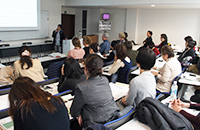International Symposium ‘Singlehood, Living Alone and Work-Life Conflict in Japan’
 On February 21, 2018, the Institute for Gender Studies (IGS) hosted the international symposium ‘Singlehood, Living Alone and Work-Life Conflict in Japan’ at Ochanomizu University, organised by Annette Schad-Seifert (Specially Appointed Professor, IGS); Laura Dales (Lecturer, The University of Western Australia) and Swee-Lin Ho (Assistant Professor, National University of Singapore) were invited as keynote speakers.
On February 21, 2018, the Institute for Gender Studies (IGS) hosted the international symposium ‘Singlehood, Living Alone and Work-Life Conflict in Japan’ at Ochanomizu University, organised by Annette Schad-Seifert (Specially Appointed Professor, IGS); Laura Dales (Lecturer, The University of Western Australia) and Swee-Lin Ho (Assistant Professor, National University of Singapore) were invited as keynote speakers.  Scott North (Professor, Osaka University) and Nora Kottmann (Lecturer, Heinrich Heine University Düsseldorf) were also asked to participate, as commentators. Social issues of singles were examined from an interdisciplinary perspective, focusing on the structures of household, work and friendship.
Scott North (Professor, Osaka University) and Nora Kottmann (Lecturer, Heinrich Heine University Düsseldorf) were also asked to participate, as commentators. Social issues of singles were examined from an interdisciplinary perspective, focusing on the structures of household, work and friendship.
In her introductory remarks, ‘Japan’s Never-Married Singles in National Population Surveys’, Schad-Seifert noted that current increases in the single and never-married population is the result of several factors, including general changes in human relationships and lifestyles, as well as conditions of employment and economy. This trend is observed not only in Japan but also in Europe, the United States and other Asian countries. It appears not to be a matter of whether a country is a welfare state or not. However, there have been few empirical studies on this issue. This symposium was convened to deepen the discussion towards future development of the research.
Dales’s presentation ‘Single Women and Their Households’ was based on a series of interviews that she has been conducting since 2009. This work has shown that the depiction of single women in the media, freely enjoying the life of the gorgeous consumer, does not reflect their real lives. ‘Single’, of course, does not always mean unmarried, as is commonly presumed, but includes various conditions. Those who have never been married and have chosen not to marry, divorcees, the widowed, those in cohabitation and members of same-sex couples who cannot legally be married are all accounted single. The advancement of women into the higher education has often been alleged to be a cause of delayed marriage, but Dales’s research has uncovered that other factors, such as class, family support, place of residence and economic condition, all have greater influence than the level of education.
Single women must find a ground for their identity and a source of security from places other than marriage. Work is a socially accepted way to achieve self-realisation and makes economic independence possible. Financial hardship, however, can be severe. The so-called ‘parasite single’, a Japanese characterisation of people older than their late 20s or early 30s who is still living with their parents, may be someone who cannot manage an independent household by their income alone, due to economic difficulties. The availability of work for single mothers with dependent families and responsibility for their care are generally limited to relatively low-paying, non-regular employment. In a family-oriented non-welfare society such as Japan, women in the household are expected to take on the caregiver’s role, making another obstacle to single women.
Women’s work was further explored in another dimension in the following presentation, by Ho, entitled ‘Gendered Precarity: The Ambivalent and Conflicted Lives of Women Managers in Japan’. Ho conducted an interview study of women managers who place a high priority on work, regardless of their marital status, and she examined the reality of ‘being a manager’. Beginning in the 1990s, a period of continual restructuring began for Japanese companies, in response to the collapse of the so-called bubble economy and the beginning of the promotion by the government of women’s participation and advancement in workplaces. Women employees acquired new opportunities to take on managerial position, although such positions are often nabakari-kanrishoku, or nominal management, having disproportionate workloads and increased responsibility without pay raise or the ability to participate in decision making. In spite of these disadvantages, women generally accept these promotions. Many claim that acquisition of a new business title may lead to obtaining another, better one, while in fact, such a promotion only creates a vicious cycle.
The requirements of structural reform and the promotion of women brought with corporate strategies of cosmetic change that do not produce gains for their workers. Taking advantage of a loophole in Article 41 of Japan’s Labour Standards Act, such organisations utilise managerial positions to reduce payment obligations for overtime, forcing workers to bear the burden of additional work without additional compensation. Due to the weakness of the labour unions, Japanese workers have little power to engage in disputations with their employers. Ho raised the question of what would be required for women managers to obtain fair remuneration for their investments of money, time and effort in learning skills and developing relationships at work.
North drew attention to flaws in the relevant policies. ‘Government initiatives to promote women’, at glance, appear progressive, but a closer look reveals that what is expected from women is the flexibility required to act as shock absorber for general social problems to maintain the male-dominant system. As the working population decreases, women are expected to fill in the workforce. Where the welfare system fails to supply caregivers, women are asked to contribute. The basis for this way of thinking is the 20th century fiction of the family, in which the family is defined as a household for reproduction formed through marriage, created by the Meiji Civil Code more than a hundred years ago. In this fiction, being single is in conflict with social norms and is regarded as a problem. This treatment of women also leads to disadvantages for men: for example, if he does not earn a certain amount, a man is flatly unable to a family. To allow the promotion of women to be more than a slogan, legal assurance of equal opportunity is needed.
The environment of the workplace features the same limitations. Long working hours, discrimination against women and a patriarchal corporate-management system are justified as tradition and custom, and they are sheltered from legal control. In such circumstances, avoiding conflict may require playing a traditional gender role. Women managers may find it unpleasant to accept male domination, as if it were natural. Although this is merely a feature of the system, women managers tend to blame themselves for inability to transcend it, which escalates inner conflict. Political leaders must understand present conditions clearly and bring creativity and sympathy to bear as the confront the single society of the future.
Kottmann spoke of the concept of ‘precarity’, which was featured in the title of Ho’s presentation. This is often related to employment insecurity, but here, the word indicates a greater anxiety and uncertainty, provoked by destabilisation. Instability, in this context, can be seen as an instrument of governance under neoliberalism. Such a system is maintained in part by hierarchic inequality; therefore, precarity and inequality will never be eliminated under a neoliberal administration.
Kottmann continued by illustrating how single women in current society cope with precarious conditions. Her interviews have found that building personal networks and securing personal space must form part of any solution. Single women obtain advice and emotional support from their personal networks more than they do from their families, which were once the main source of this kind of assistance, and they regard this friendship as vital. They also consider it vital to have their own residences or rooms. These spaces are tangible expressions of their freedom. Additionally, Kottmann raised the question of whether this type of need for personal networks and spaces are limited to single women or whether others require them as well.
In the following Q&A session, questions on work-life conflict and the differences between large cities and rural areas were asked, and lively discussion among speakers and audience members ensued. A plan for the symposium was drawn up to explore possible directions for future research on the single society and gender. The participation of a large, enthusiastic audience from both on- and off-campus indicates the widespread interest in the theme. We await the development of research along the lines laid out in this symposium and future opportunities for reporting research products.

